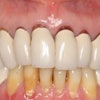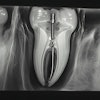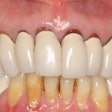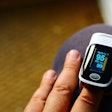
Using a cold saline solution as a final irrigating agent during root canal treatment may reduce patients' postoperative pain, according to a systematic review published on November 28 in the Journal of Evidence Based Dental Practice.
Intracanal cryotherapy, which is the superficial application of a cold solution, such as saline, to alleviate pain, may be most effective at reducing postoperative pain one day after root canal treatment or obturation, the authors concluded.
"Cryotherapy (using cold saline as the final irrigant) can be a promising approach to control postoperative pain," wrote Drs. Xiaoyan Zhou, PhD, and Shanika Nanayakkara, PhD, from the University of Sydney School of Dentistry.
Up to 58% of patients experience postoperative pain after nonsurgical endodontic treatment, they noted. This pain is often due to periradicular inflammation in response to chemical, microbiological, and mechanical injuries to tissue.
To improve patients' experience, postoperative endodontic pain needs to be better prevented and managed. Cryotherapy has been suggested to manage this pain. Previous evidence has shown that using this approach during root canal therapy reduces pain by limiting inflammation, reducing the speed of pain impulse conduction and the activation threshold of thermoreceptors, which are a type of pain nociceptor.
For this review, the authors evaluated eight articles that included 810 participants. The articles focused on postoperative pain after root canal instrumentation or obturation procedures in adults who needed root canals due to pulpal or periradicular diseases. In the studies, researchers analyzed the effect of cryotherapy on pain reduction during different intervals over 72 hours following root canal therapy.
The meta-analysis revealed that patients who underwent cryotherapy experienced significantly reduced pain at 24 hours after the procedure (mean deviation, -1.43; 95% confidence interval, -0.70 to -2.15; p < 0.05), compared with patients who did not receive a cold saline solution during treatment. In most of the studies in the review, pain reduction occurred when using 20 mL of cold saline at 2.5° C for five minutes, Zhou and Nanayakkara wrote.
One limitation of the review is that the studies selected were limited to patients who underwent root canals. Therefore, it is possible that evidence reported in prospective and retrospective observational studies may have been missed, the authors noted.
More studies are needed to provide evidence-based clinical recommendations on ideal dosage, saline temperature, and duration of intracanal irrigation. However, using a cold saline solution as an irrigating agent appears to be an effective way to manage pain, they concluded.
Compared with other treatment strategies for managing postoperative pain, including occlusion reduction and prescribing postoperative medications, "cryotherapy is widely recognised as a simple, non-invasive and cost-effective option," they wrote.




















